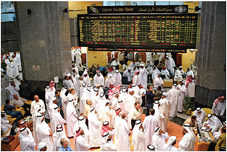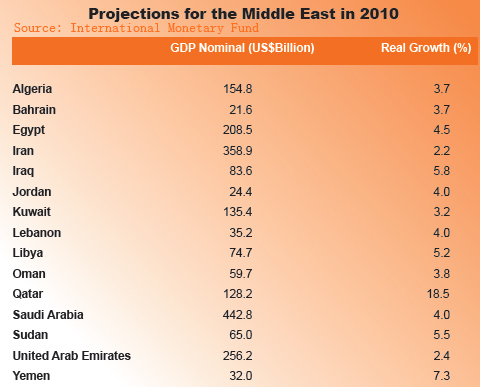
Leading international agencies and analysts predict that the world is emerging out of the global economic crisis that has affected most industries and even the richest countries. The International Monetary Fund (IMF) expects the global economy to grow by 3% in 2010, an improvement from the 1% contraction this year. In its report on the Regional Economic Outlook for the Middle East and Central Asia, the IMF said that economies are stabilising and are expected to experience higher growth next year, but are not yet totally out of the crisis. The stimulus packages implemented by the various countries in the region have helped ease the impact of the recession, yet these have increased public debt as well. But the IMF expects economies in the MENA and Pakistan region to grow collectively by 4% in 2010, up from 2.2% in 2009. The outlook for GCC countries varies. For instance, while Qatar is expected to see real GDP growth of 18.5% in 2010, Saudi Arabia is projected to rebound at 4%. The UAE is expected to experience GDP growth of 2.4% in 2010, 3.7% growth for Bahrain, 3.2% growth for Kuwait and 3.8% GDP expansion for Oman. The IMF also expects that the oil exporters would record surpluses of between $100 billion and $125 billion as against $50 billion in 2009.

There won't be much reason to celebrate at this point since recovery will remain slow. However, policies of governments to restore financial sector viability will do much, especially when implemented in tandem with the stimulus packages. As the world emerges from the gloomy economic scenario, industries are also getting ready to meet resurging demand especially in the are as of automotive and auto parts manufacturing, electronics and electrical industry, the health and medical sector, and consumer products. Such will definitely benefit the plastics industry as it gears to develop and launch newer, better and more cost-efficient materials, machinery and technology. We gathered the insights of companies on what were the factors that affected their operations this year, their programmes and plans for 2010. The Middle East is a region with tremendous future that values more and more high quality specialty products such as Thermoplastic Polyurethanes (TPUs). TPU is the material of choice for high performance solvent-based adhesives for the growing footwear industry of the Middle East. It is also the material of choice for automotive gear knobs because of its abrasion and scratch resistance and the Middle East car industry is now considering its use. The region's textile industry is also increasingly tapping TPU for textile coatings as an alternative to PVC and the Middle East textile industry now prefers it for halogen free applications. It also serves as an excellent modifier for PVC and as such Middle East compounders are enjoying its benefits such as improved impact and abrasion resistance. Merquinsa has a long historical presence in the Middle East - since 1964 --- and we have been serving a wide range of industries such as footwear, textile or automotive with our well recognised Pearlstick and Pearlthane TPU products. In 2010, we are looking to expand our network of agents & distributors and looking forward for new additional partners to deliver Merquinsa's value proposition to the Middle East market. Establishing new contacts and business relationships in the region is part of our strategy in the years to come.

Jean Marc Galvez Global Commercial Manager Merquinsa Tel: +34- 93 572 1100 Fax: +34-93 572 0934 E-mail: JMGalvez@merquinsa.com; info@merquinsa.com Website: www.merquinsa. Com "The Middle East is a region with tremendous future that values more and more high quality specialty products" Certainly the global economic recession has impacted our business aro
balerínky Leading international agencies and analysts predict that the world is emerging out of the global economic crisis that has affected most industries and even the richest countries. The International Monetary Fund (IMF) expects the global economy to grow by 3% in 2010, an improvement from the 1% contraction this year. In its report on the Regional Economic Outlook for the Middle East and Central Asia, the IMF said that economies are stabilising and are expected to experience higher growth next year, but are not yet totally out of the crisis. The stimulus packages implemented by the various countries in the region have helped ease the impact of the recession, yet these have increased public debt as well. But the IMF expects economies in the MENA and Pakistan region to grow collectively by 4% in 2010, up from 2.2% in 2009. The outlook for GCC countries varies. For instance, while Qatar is expected to see real GDP growth of 18.5% in 2010, Saudi Arabia is projected to rebound at 4%. The UAE is expected to experience GDP growth of 2.4% in 2010, 3.7% growth for Bahrain, 3.2% growth for Kuwait and 3.8% GDP expansion for Oman. The IMF also expects that the oil exporters would record surpluses of between $100 billion and $125 billion as against $50 billion in 2009.
Leading international agencies and analysts predict that the world is emerging out of the global economic crisis that has affected most industries and even the richest countries. The International Monetary Fund (IMF) expects the global economy to grow by 3% in 2010, an improvement from the 1% contraction this year. In its report on the Regional Economic Outlook for the Middle East and Central Asia, the IMF said that economies are stabilising and are expected to experience higher growth next year, but are not yet totally out of the crisis. The stimulus packages implemented by the various countries in the region have helped ease the impact of the recession, yet these have increased public debt as well. But the IMF expects economies in the MENA and Pakistan region to grow collectively by 4% in 2010, up from 2.2% in 2009. The outlook for GCC countries varies. For instance, while Qatar is expected to see real GDP growth of 18.5% in 2010, Saudi Arabia is projected to rebound at 4%. The UAE is expected to experience GDP growth of 2.4% in 2010, 3.7% growth for Bahrain, 3.2% growth for Kuwait and 3.8% GDP expansion for Oman. The IMF also expects that the oil exporters would record surpluses of between $100 billion and $125 billion as against $50 billion in 2009.  There won't be much reason to celebrate at this point since recovery will remain slow. However, policies of governments to restore financial sector viability will do much, especially when implemented in tandem with the stimulus packages. As the world emerges from the gloomy economic scenario, industries are also getting ready to meet resurging demand especially in the are as of automotive and auto parts manufacturing, electronics and electrical industry, the health and medical sector, and consumer products. Such will definitely benefit the plastics industry as it gears to develop and launch newer, better and more cost-efficient materials, machinery and technology. We gathered the insights of companies on what were the factors that affected their operations this year, their programmes and plans for 2010. The Middle East is a region with tremendous future that values more and more high quality specialty products such as Thermoplastic Polyurethanes (TPUs). TPU is the material of choice for high performance solvent-based adhesives for the growing footwear industry of the Middle East. It is also the material of choice for automotive gear knobs because of its abrasion and scratch resistance and the Middle East car industry is now considering its use. The region's textile industry is also increasingly tapping TPU for textile coatings as an alternative to PVC and the Middle East textile industry now prefers it for halogen free applications. It also serves as an excellent modifier for PVC and as such Middle East compounders are enjoying its benefits such as improved impact and abrasion resistance. Merquinsa has a long historical presence in the Middle East - since 1964 --- and we have been serving a wide range of industries such as footwear, textile or automotive with our well recognised Pearlstick and Pearlthane TPU products. In 2010, we are looking to expand our network of agents & distributors and looking forward for new additional partners to deliver Merquinsa's value proposition to the Middle East market. Establishing new contacts and business relationships in the region is part of our strategy in the years to come.
There won't be much reason to celebrate at this point since recovery will remain slow. However, policies of governments to restore financial sector viability will do much, especially when implemented in tandem with the stimulus packages. As the world emerges from the gloomy economic scenario, industries are also getting ready to meet resurging demand especially in the are as of automotive and auto parts manufacturing, electronics and electrical industry, the health and medical sector, and consumer products. Such will definitely benefit the plastics industry as it gears to develop and launch newer, better and more cost-efficient materials, machinery and technology. We gathered the insights of companies on what were the factors that affected their operations this year, their programmes and plans for 2010. The Middle East is a region with tremendous future that values more and more high quality specialty products such as Thermoplastic Polyurethanes (TPUs). TPU is the material of choice for high performance solvent-based adhesives for the growing footwear industry of the Middle East. It is also the material of choice for automotive gear knobs because of its abrasion and scratch resistance and the Middle East car industry is now considering its use. The region's textile industry is also increasingly tapping TPU for textile coatings as an alternative to PVC and the Middle East textile industry now prefers it for halogen free applications. It also serves as an excellent modifier for PVC and as such Middle East compounders are enjoying its benefits such as improved impact and abrasion resistance. Merquinsa has a long historical presence in the Middle East - since 1964 --- and we have been serving a wide range of industries such as footwear, textile or automotive with our well recognised Pearlstick and Pearlthane TPU products. In 2010, we are looking to expand our network of agents & distributors and looking forward for new additional partners to deliver Merquinsa's value proposition to the Middle East market. Establishing new contacts and business relationships in the region is part of our strategy in the years to come.  Jean Marc Galvez Global Commercial Manager Merquinsa Tel: +34- 93 572 1100 Fax: +34-93 572 0934 E-mail: JMGalvez@merquinsa.com; info@merquinsa.com Website: www.merquinsa. Com "The Middle East is a region with tremendous future that values more and more high quality specialty products" Certainly the global economic recession has impacted our business arobalerínky
Jean Marc Galvez Global Commercial Manager Merquinsa Tel: +34- 93 572 1100 Fax: +34-93 572 0934 E-mail: JMGalvez@merquinsa.com; info@merquinsa.com Website: www.merquinsa. Com "The Middle East is a region with tremendous future that values more and more high quality specialty products" Certainly the global economic recession has impacted our business arobalerínky
 iConnectHub
iConnectHub
 Login/Register
Login/Register Supplier Login
Supplier Login


























